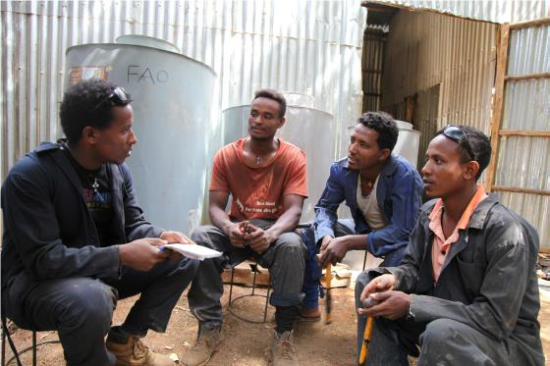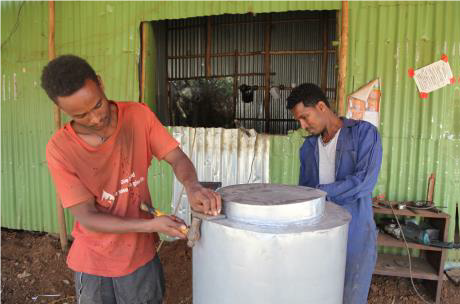A youth group comprising four members was established three years ago in Ethiopia, Durbete, South Achefer district with the support of a project which aims to build the capacity of farmers and extension workers to reduce post-harvest food losses. These young people were drawn from rural communities and were unemployed despite having completed vocational training on metalwork engineering. The young men were first given training on how to make improved grain storage containers (metal silos) using sheet metal which maintained the quality of crops by preventing spoilage caused by pests, rodents and mould.
group comprising four members was established three years ago in Ethiopia, Durbete, South Achefer district with the support of a project which aims to build the capacity of farmers and extension workers to reduce post-harvest food losses. These young people were drawn from rural communities and were unemployed despite having completed vocational training on metalwork engineering. The young men were first given training on how to make improved grain storage containers (metal silos) using sheet metal which maintained the quality of crops by preventing spoilage caused by pests, rodents and mould.
The group members explained, “We learned how to make quality metal silos at Melkasa Research Institute. Following the training, the project supported us with the required tools and inputs to start making metal silos ourselves. The local government supported us with providing a workshop site. The local Bureau of Agriculture office supported us with improving the quality of the containers and promoting the products among farmers”.
“During the first round we made 67 metal silos, each which had a capacity of six quintals. The project purchased and distributed them to farmers, and during the second round we received a loan of 60 000 ETB (approximately USD 2 181) which we used to buy materials ourselves to make 138 metal silos, which were then distributed to farmers through the project”.
“The demand for the metal silos is growing gradually as farmers are learning about their benefits. Based on the interest of farmers we designed new types of silos by increasing the capacity to eight and ten quintals. As the demand is growing, we made and supplied 36 new metals silos to respond to direct orders from the local farmers”.
“To promote our work we attended farmers meetings and trade shows to share what we learned from the training and the benefits of metal silos. We recently participated in a “Feed the Future” agriculture fair show. We promoted the benefits of metal silos and managed to enlist 40 farmers who wanted to order metal silos in the future”.
“We have purchased more tools to expand our products to other local needs including flour bags and other metal works. Our capital is growing gradually and estimated it to be nearly 400 000 ETB (approximately USD 14 545).”
“It is a challenge to make and sell metal silos for a low cost. The price of sheet metal increases from time to time. If loan schemes are facilitated for farmers we can avail the technology for more farmers”.
and sell metal silos for a low cost. The price of sheet metal increases from time to time. If loan schemes are facilitated for farmers we can avail the technology for more farmers”.
“By doing our job we are doubly satisfied. Through the project we have an employment opportunity. We are happy that we work in our own community. We invest our time and skills into our business, which we dream of transforming into a manufacturing industry. Secondly, we learned new skills and are a part of the solution to a local problem. We are happy to contribute towards the benefit of our own communities. We are encouraged by the feedback we received. Many farmers tell us that metal silos have prevented grain loss and reduced the burden on women.
By; Aresawum Mengesha, Agri-bussiness/ FFS Officer (Aresawum.Mengesha@fao.org
